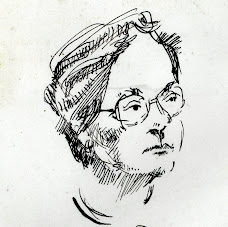Normally, when I go to the beach in South Carolina to spend time with my oldest friends, we spend most of our time catching up with each other and our reading. This year, though, enticed by a new DVD player, we did watch one film, Babette's Feast (1987). Like any self-respecting Danish-American-by-marriage, I'd already seen this several years ago, but was willing to watch again.
The film introduces two elderly sisters, daughters of a country pastor who appears to have formed his own denomination or at any rate branch of Lutheranism. Even after his death, his congregation continues to meet, more or less led by the daughters. Although, as it's the 1880s, they aren't considered pastors, they appear to function as such. The group's theology may at first seem Puritanical and pietistic, closer to the Indre Mission or 'holy Danes' than to the Grundtvigian or 'happy Danes' with whom I'm more familiar. However, as I thought about it and discussed it with Onkel Hankie Pants, we agreed that some of what seems Puritanical was simply extreme poverty. The importance of loving and forgiving each other is stressed more than once in scenes involving the congregation, and the singing of hymns is a major feature of their simple home worship.
In the early part of the film we are told that the sisters have a French cook, and then we see flashbacks that explain how this happened. Both sisters had suitors in their youth -- one was courted by a young military officer whose aunt is a member of the congregation; the other, a talented singer, by a French opera star who came to their seaside village to recuperate and ended up giving her voice lessons. The military officer finds the lure of a court position too tempting and departs; the opera singer is rebuffed when his pupil sees that his ambitions for her would mean she'd be choosing worldly success over the life of service her father has modeled. Years later, the opera singer sends them Babette, a refugee from the Franco-Prussian War, and begs that they will take her on as a cook and general factotum, which they do. Babette is alarmed by having to learn how to cook salt codfish and Øllebrød (a soup of stale bread and ale), but her cooking and bargaining skills do make an improvement in the sisters' standard of living.
The climax of the film occurs when the sisters plan an anniversary dinner in honor of their late father's 100th birthday. Babette, who has just won 10,000 francs in the French lottery, asks to be allowed to prepare the meal. She sends back to France for ingredients and wines, and pays for it all herself. Only at the end do we realize that, like the widow who gave her mite (Luke 20:45-47, 21:1-4) or the woman who anointed Jesus' feet (Luke 7:36-50), Babette has given all she had for the love of the people of the community.
There are many more aspects of this film, based on a story by Isak Dinesen, which could be discussed; but since I have several more films to review, I'll leave you with this and a recommendation to watch or re-watch this fine film.
Subscribe to:
Post Comments (Atom)


No comments:
Post a Comment